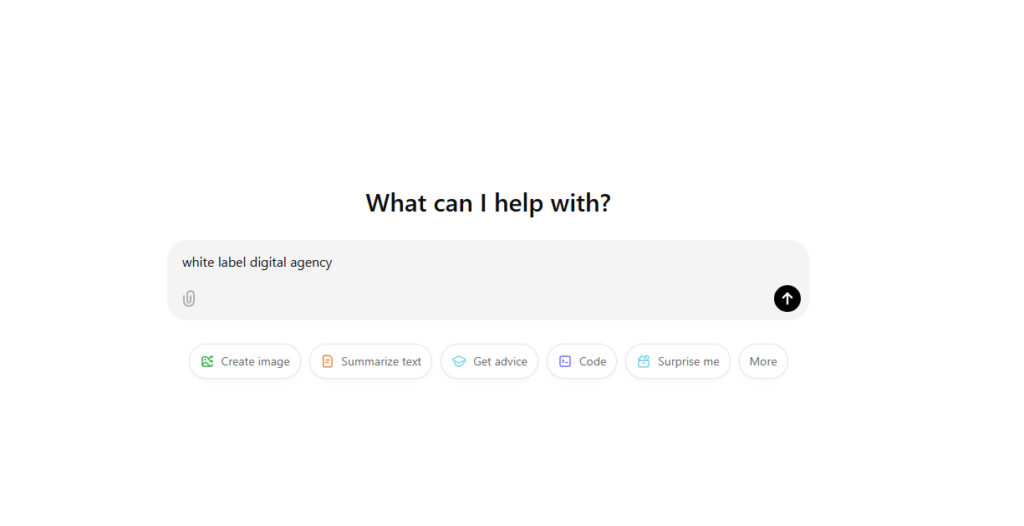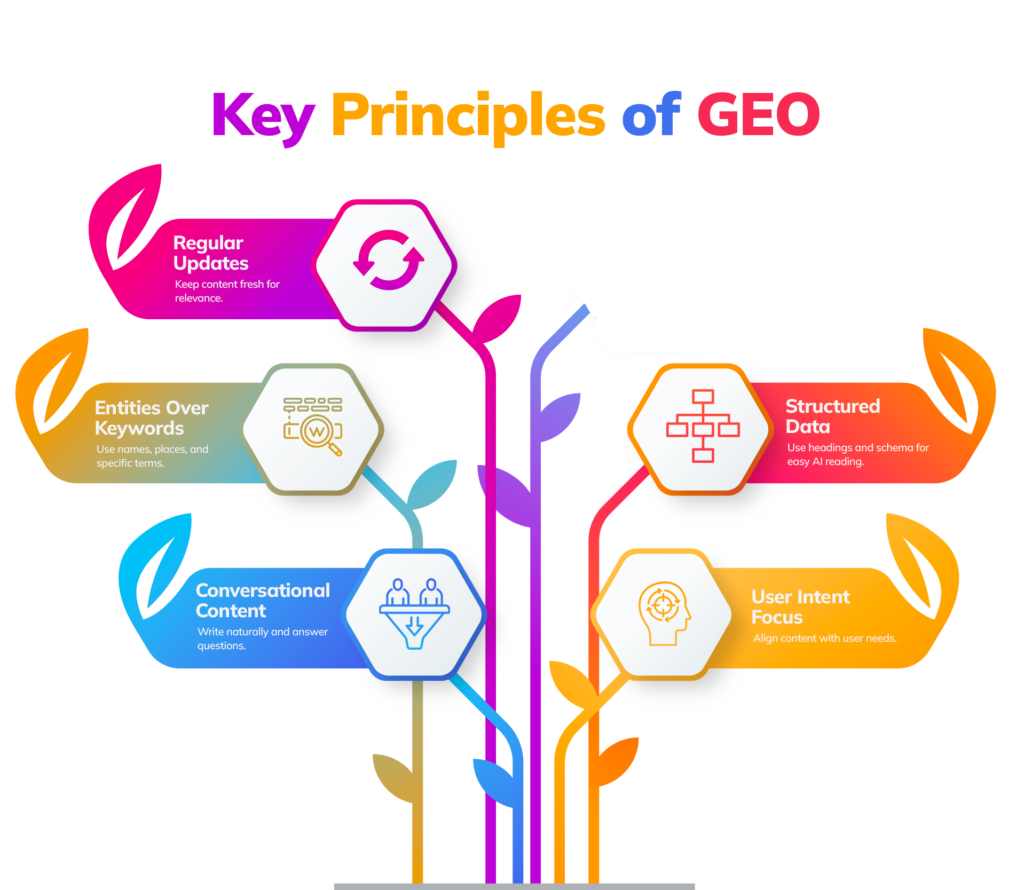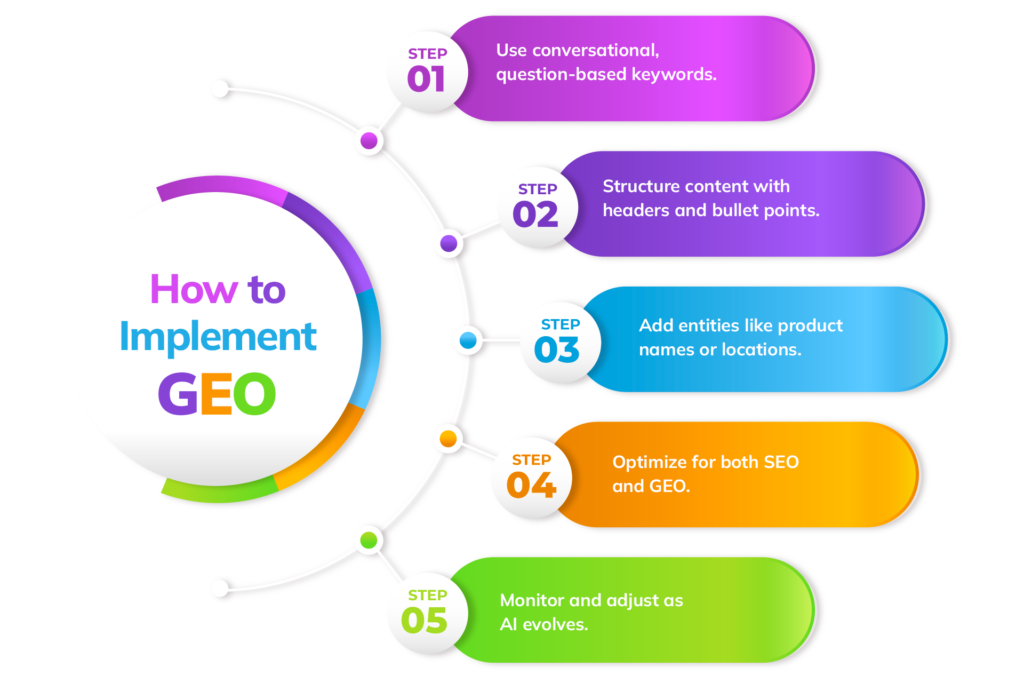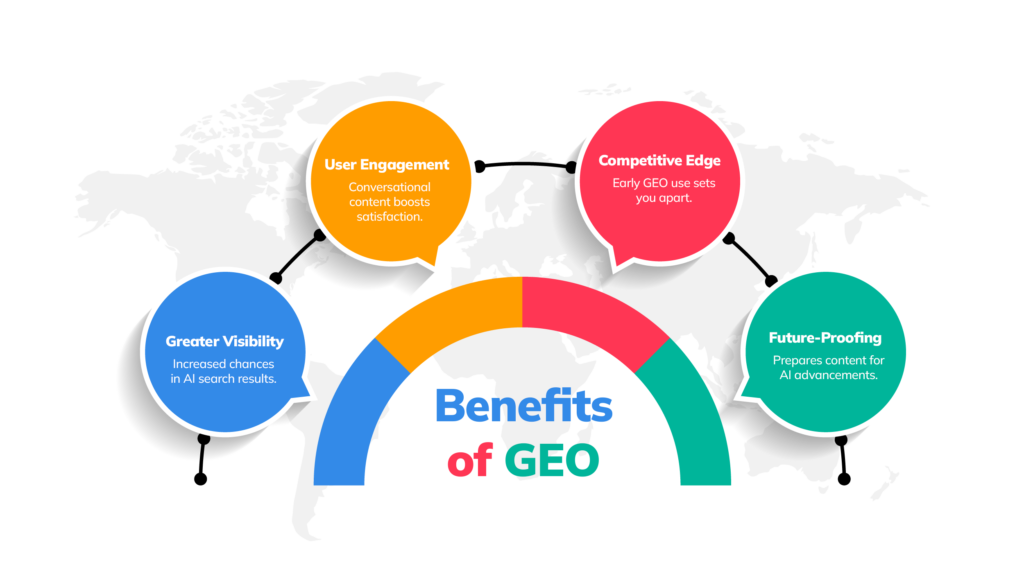What is Generative Engine Optimization (GEO)?
Key Highlights
- Generative Engine Optimization (GEO) is a new approach to optimizing digital content in the age of AI-powered search.
- Unlike traditional SEO, which focuses on ranking in search engine results pages (SERPs), GEO aims to make your content discoverable and readily interpretable by AI algorithms.
- With the rise of platforms like ChatGPT, Perplexity AI, and Google AI Search, understanding GEO is crucial for staying ahead in the evolving digital landscape.
- GEO involves creating high-quality, well-structured, and informative content that caters to user intent and aligns with how AI engines process information.
- By embracing GEO, businesses can enhance their content’s visibility, reach a wider audience, and thrive in the era of AI-driven search.
The world of digital marketing is always changing. One big change is the rise of AI-powered search. Search engines are getting smarter. Because of this, businesses can’t just depend on old SEO methods anymore. Generative Engine Optimization (GEO) has become a key strategy, helping businesses keep their content visible and engaging in this new age of AI.
What is Generative Engine Optimization (GEO)?
Generative Engine Optimization (GEO) is the process of tailoring content to appear in the answers provided by AI tools and platforms like ChatGPT, Gemini, Google’s AI Overviews, Claude, and Perplexity. Representing a shift towards AI-driven content creation and optimization for search engines, GEO focuses on creating dynamic, adaptive content tailored for AI-powered search algorithms. Learn how GEO is shaping the future of digital marketing.


The Evolution of Search: From SEO to GEO
Traditional SEO has long been a key part of digital marketing. It helps businesses show up better on search engines like Google. It mostly focuses on optimizing content for certain keywords, getting backlinks, and making the site faster and friendlier for mobile users. These things are still important. However, the rise of AI engines represents a significant shift in how people search for information.
AI engines are different from regular search engines. They do not just give a list of web pages. They utilize Natural Language Processing (NLP) to interpret the intent behind search queries. They take information from many sources to give a clear, complete, and thoughtful answer.
Because of this difference, we need to change how we optimize content. It’s not just about keywords anymore. We need to create content that helps AI understand and combine information. This is where GEO becomes important. It connects traditional SEO with what AI-driven searches need.
Why GEO Matters in the Age of AI-Powered Search
The increased use of AI search engines brings both challenges and chances for businesses. As these engines get better at understanding what users want, just using old SEO methods might not be enough to keep content visible. GEO helps with this by looking at how AI understands and processes information.
By using GEO ideas, businesses can make sure their content works well with how AI algorithms understand natural language and find relevant information. This means creating clear, well-organized content that answers user queries in a simple way for AI to process.
In short, GEO is about making your content strategy strong for the future. It helps you keep up with changes in the digital landscape. By adjusting to AI search capabilities, businesses can boost content visibility, reach more people, and encourage better engagement over time.


Key Principles of Generative Engine Optimization
GEO is all about how AI understands information and finds helpful content. It means creating content in a way that fits what AI does best. This involves giving clear, simple, and relevant information.
Some key GEO principles are:
- Focus on user intent
- Organize content to make it easy to read
- Use important keywords
- Give detailed answers
- Build trust using reliable sources and expert knowledge
When we follow these principles, we make content that is useful for both people and the AI algorithms that help with search.
How to Optimize for Generative Engines
Optimizing for AI engines means paying attention to what you write and how it looks. Good writing that is helpful is very important. Including bullet points and lists is also beneficial. Make sure the paragraphs connect well, too. Using structured data markup can help AI engines understand your content better. This can make it stand out more in the responses generated.


Creating In-Depth, Conversational Content
Creating detailed and friendly content is very important for success in generative engine optimization. When you make content that fits what users are looking for and uses relevant keywords in a natural way, you help make it easier to find and better for users. Leveraging generative AI engines and NLP methods can boost your content quality, making it more engaging and informative. Focus on understanding user needs and offering helpful, friendly content. By using these tips in your content creation process, you can effectively increase user engagement and attract more organic traffic.
Targeting Long-Tail and Question-Based Keywords
To enhance generative engine optimization (GEO) efforts, targeting long-tail and question-based keywords is crucial. Unlike traditional SEO techniques, GEO focuses on understanding user intent through natural language processing, optimizing for search algorithms powered by AI. Long-tail keywords capture specific search queries, driving organic traffic and enhancing the generative experience. Question-based keywords cater to user needs and mimic real user queries, aligning with the advanced algorithms of generative AI engines. By strategically implementing these optimization strategies, content creators can improve the search experience and elevate their digital content in the evolving digital landscape.


Utilizing Entities and Topic Context
AI algorithms are getting better not only at finding keywords but also at understanding the people, places, organizations, and ideas related to a topic. Try to organize your content in a clear way. Use headings, subheadings, and bullet points to group related ideas. This helps AI algorithms quickly find and understand the main parts and connections in your content, making it more relevant.
The main goal is to make it easy for AI to know what your content is about. It should also help AI show your content better when users search for information. By focusing on being clear and simple in your writing, you can make your content more attractive to both readers and the AI that affects their search experience.
Organizing Content with Internal Linking and Clustering
Organizing your content well is very important for keeping users engaged and improving how easily people can find you online. Internal linking is one way to achieve this. It connects similar content on your site. When you do it strategically, search engines can better understand how different pages relate to each other. This makes it easier for users to find information, improving their overall experience.
Content clustering takes internal linking a step further. It improves your website’s layout and navigation while showcasing your expertise and trustworthiness on important topics. This can improve how the AI algorithms see your content’s reliability.


The Benefits of Generative Engine Optimization
By using GEO principles, businesses can gain clear benefits like better visibility, improved user experience, and a stronger online presence. AI search engines are changing how people find and use information. So, it is important to optimize for these platforms to keep up.
Additionally, GEO helps build brand authority and trust by aligning content with AI’s emphasis on reliable and informative sources.
GEO Best Practices for Luminary Software Clients
For our important Luminary software clients, making content work for generative search engines is not just a trend—it’s a smart move. By following certain GEO practices, you can make sure your content is different, catches the eye of your audience, and leads to real success in this busy digital landscape.
The secret is to create clear, complete, and trustworthy content that answers your audience’s questions. This way, it matches how AI looks at information. By using GEO now, you can strengthen your online presence, build stronger connections with customers, and unlock new growth opportunities in the age of AI.


FAQ and Q&A Content Creation
Creating FAQ and Q&A sections on your website is a good way to help users and please search engines. FAQs give clear answers to common questions. This helps users and shows that you know your audience well.
For GEO, well-made FAQ pages can work as useful resources for AI algorithms. By using relevant keywords and asking questions naturally, you make your content better for long-tail keyword optimization. This increases the chances of your content showing up in search results.
FAQs can also explain specific parts of your products, services, or industry, showcasing your knowledge and building trust with potential customers. This method boosts SEO and positions your brand as a helpful guide in your industry.
Optimizing for Multimodal Content
Generative search engines often show results in different formats. This includes text, images, videos, and social media posts. To increase your visibility and user engagement, it’s important to go beyond just written content.
Here are some ideas to help you boost your content’s reach:
- Images and Infographics: These can help people understand your content better and make it more likely to be shared on social media.
- Videos: Create interesting videos that respond to user queries or show off your product features.
- Audio Content: Use podcasts or audio snippets to give useful information in a way that’s easy to consume.
- Interactive Elements: Things like quizzes, polls, or calculators can make your content more engaging and fun for users.
By mixing up your content and tailoring it for different formats, you can reach more people, make your content easier to access, and help it stand out in today’s ever-changing online search world.


Keeping Content Updated and Relevant
In the changing online world, content marketing needs you to adapt. It is important to keep your content fresh and current. By checking and updating your existing content regularly, you keep it useful and correct. This boosts its value for users and search engines.
When you refresh your content, it is more than just making small changes or adding a few sentences. You should do deep keyword research to find new and relevant keywords for your topic. Use these keywords naturally in your content to help it show up in search results.
Updating your content with the latest facts, insights, and relevant keywords is key. This helps it stay on top in search rankings and brings in organic traffic. By doing this, you show that you care about giving valuable information. This can improve your website’s trust and authority with users and AI-driven search engines.
Start Your GEO Journey with Luminary Software
Navigating the changing world of search engine optimization can be tough. But Luminary Software is here to make your GEO journey easier. Our tools and services help businesses succeed in the age of AI-powered search.
We offer advanced keyword research tools. We also provide complete content analysis and optimization resources. Our team gives you the insights and support you need to make your content easily found by both people and the AI algorithms shaping search in the future.

Frequently Asked Questions
Small businesses need to recognize the importance of social media marketing. It helps build their brand, engage directly with their target market, and expand their organic reach on various social media platforms.
The frequency of your posts depends on your content strategy, social media presence, and the type of content you use.
We manage various social platforms. We specialize in handling Facebook, Instagram, Youtube and Linkedin. Our digital marketing services are aligned with your business goals to ensure your social media presence remains strong
Each marketing campaign varies in terms of when results appear. We monitor progress closely and adjust strategies as needed. We keep our clients updated throughout the process.
Social media marketing can help grow your business by strengthening your brand and expanding your client base.
Social media advertising, targeted marketing, and active community management all contribute to building brand awareness and increasing customer engagement.


